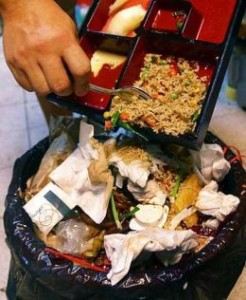SHAH ALAM, 18 Sept: The people should be aware that food wastage of 8,000 tonnes a day has become more serious because it has a long-term effect especially in the throwing of solid waste, said the Federation of Malaysian Consumers Associations (FOMCA).
Their Communications Director, Mohd Yusof Abdul Rahman, said that it is the duty of Local Authorities to collect solid waste, however the people should strive to control this as landfills can no longer sustain the growing amount of rubbish.
He said that lack of awareness to recycle waste materials, including food, is also another factor that has led to the overwhelming waste heap.
“Food waste has many uses, one of which is that they can be given to livestock and if processed, it can be made into organic fertiliser and fuel.
“If waste is just thrown away, it will have a long-term effect and lack in garbage collection centres, and most of them are at unsuitable areas (near rivers) which eventually lead to pollution due to the waste,” he said.
Therefore, he suggested for the people to be moderate in food intake so that concerns over the issue of waste can be reduced.
He also suggested for a central food collection centre to be established so that it can benefit the public to channel surplus food to the needy.
“So, wouldn’t it be better if we can collect surplus food at collection centres so that it can be given to those in need such as orphans and welfare homes.
“It needs to be practiced by everyone in the society,” he said.
The people thrown up to 8,000 tonnes of food or eight million kilograms per day and this amount can feed six million people.
The Chief Executive Officer of the Solid Waste Management and Public Cleaning Body (PPSPPA), Datuk Ab Rahim Md Noor, said that the cost of managing solid waste, including discarded food which is just thrown away, also involves billions of ringgit in cost.
He said that the percentage of food composition was found to have increased by 15 to 20 percent during festive seasons.
NS

